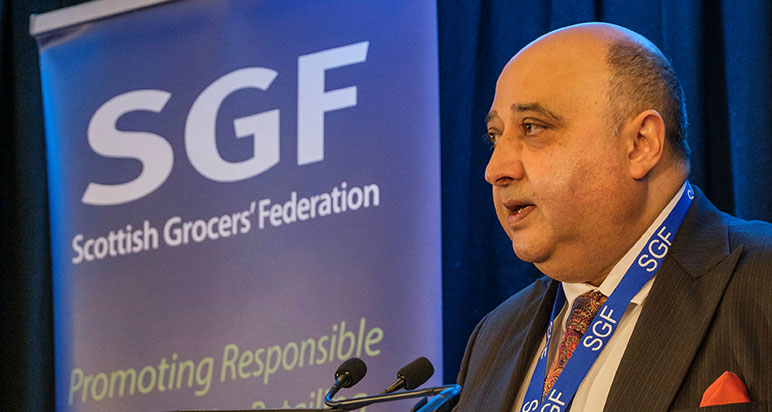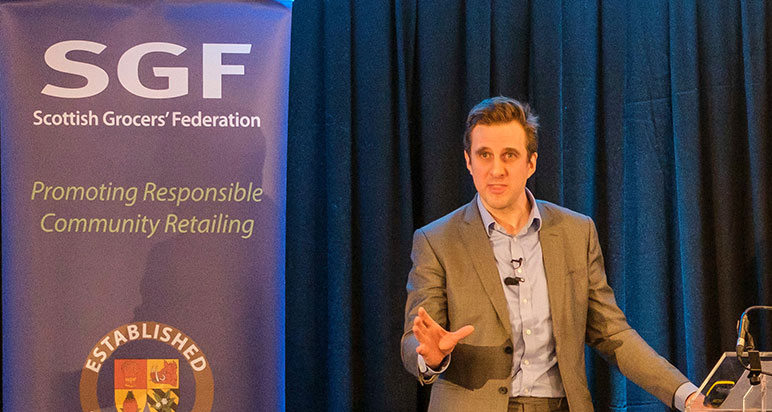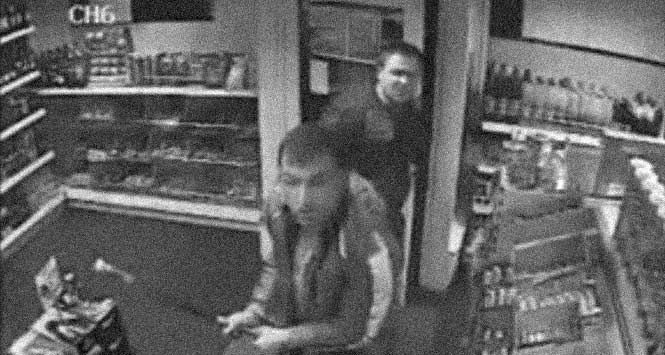Last month’s SGF Crime Seminar made it crystal clear that nothing has really changed in the past couple of decades and crime remains as endemic as it has always been – so how do we find a way forward?
By Antony Begley
It may or may not have been Einstein who said that the definition of insanity is doing the same thing over and over again and expecting different results, but whoever said it could definitely have had retail crime in mind.
SLR has been reporting on the local retailing industry for the best part of a quarter of a century and while many things have changed in the industry over those years, crime isn’t one of them. For as long as we’ve been writing about retail, crime has been endemic.
Somewhat oddly, the only time when things appeared to improve was during Covid. As Scottish Grocers’ Federation (SGF) Chief Executive Pete Cheema pointed out at last month’s SGF Crime Seminar, it wasn’t that long ago that local retailers were being heralded as “the fourth emergency service” and were being clapped on the streets of Scotland every week alongside their fellow heroes in the NHS.
How quickly times have changed. SGF’s most recent Scottish Crime Report for 2023/24 shows that retail crime is arguably worse than ever. A full 100% of retailers surveyed reported that shoplifting has increased in the last year, with 99.5% of them reporting that it happens on a daily basis.
Recent data from the Association of Convenience Stores shows that incidences of theft from shops rose from a shocking 1.1 million to a frankly inconceivable 5.6 million in the last year. It’s worth reading that last sentence again. That’s an increase of over 400% in a single year.
Over the same period, the number of violent incidents increased from 41,000 to 76,000.

Calling the police
So, with crime at levels like that and violence commonplace against people simply doing their jobs, it would be logical to assume that the police are tackling the issue like the epidemic it is. Not so. Some 93.6% of respondents to SGF’s Crime Survey said that police response times to incidents are either unsatisfactory or significantly delayed. So much so, in fact that over three-quarters (76.7%) say they are either unlikely or very unlikely to even bother reporting incidents. What’s the point?
Cheema did accept that the current “tsunami of retail crime” is worsened by both “the current economic conditions and pressure on the police in terms of enforcement”. Cheema cited a “minor £30m” increase in the police budget announced in the recent Budget statement but rightly denounced as “derisory”.
He also confirmed that the Scottish Government has refused to commit further funding to the #notpartofthejob campaign. With police enforcement effectively rare to non-existent, he said, “criminals believe themselves untouchable”.
Positive Act

One of the very few positive real changes to take place in recent times was the introduction of Daniel Johnson MSP’s Protection of Workers Bill which subsequently became law. Johnson, a former retailer himself, took to the stage to give an impassioned presentation of why he worked so hard to secure the safe passage of his Bill, referring to his personal experience of the “traumatic” and “long-lasting” effects of in-store violence and abuse.
He commented: “This is not just a crime, it’s traumatic. It’s violence happening in your own workplace, and you can’t avoid your place of work,” adding that no-one should be fearful to simply do their job.
Since the introduction of the Act, however, the results have been positive if less than game-changing. A total of 3,000 cases have been referred to court leading to 1,199 convictions with 1,313 still ongoing. Only 154 so far were not pursued. That’s clearly progress, but it’s barely a trickle amidst a torrent of retail crime.
Johnson did, however, make the salient point that retail crime is often viewed as “not a big deal,” but if that’s the case, why have there been so many convictions under the new Act?
“My Bill was a good step forward, but we need to go much further,” he said. “At heart, this is a social problem. We need to educate people that it’s not acceptable to be abusive or violent towards shopworkers simply doing their jobs”.
Johnson called on the Scottish Government to “step up” to deliver “a much bigger public awareness campaign”. He highlighted that the Scottish Government is one of the largest spenders on social media in the UK and suggested that “they can afford to spare some of that for something this important”.
Since the introduction of Daniel Johnson MSP’s Protection of Workers Bill, the latest figures show:
- 3,000 cases referred to court
- 1,199 convictions
- 154 cases not pursued
- 1,313 cases still ongoing
Education, education
That crime is a social problem is undeniable, and it was a point also referred to by the next speaker, Tim Mairs, Assistant Chief Constable at Police Scotland. He said: “I’m here today not just as a police officer, I’m also here as a community member. I live in rural Perthshire and my local shop is a hub for our community. I see everything you do for the community, and I saw what you achieved during the pandemic – and you have a right to be safe and secure in your business. But we can’t arrest our way out of this, we have a wider social challenge in front of us.”
Mairs cited cost-of-living challenges and the organised crime element as playing key roles in the current spike in crime and accepted that shopflifting has become “a more persistent trend than other crimes” post-Covid.
“I am proud that in Scotland we have legislation protecting shopworkers,” he said, “and we are getting outcomes. We are progressing the vast majority of cases but it takes time and the system is heavily backlogged.”
Worryingly, Mair said Police Scotland data shows that the biggest spike in retail crime is coming from much younger customers “in their mid to late teens” but reiterated that “law enforcement may not be the best way to deal with that”, calling it a “wider issue”.
He did however urge retailers to keep reporting crimes to allow the police to gain a clearer picture of the scale of the problem.
Retailer experience
A retailer panel then offered attendees a first-hand glimpse into the real-life experiences of retailers on the front line.
Dan Brown, Umar Majid and Anand Cheema all shared experiences with a general consensus, voiced by Dan, that “there’s lots of talk but no action”. He said: “People outside of retail often think I’m exaggerating when I tell them about life in a store, but there’s retailers being killed at their place of work. How many of us have to die before this problem gets the attention it deserves?”
Dan shared how he had been threatened by a knife and his fiancée had literally looked down the barrel of a shotgun, while Anand reeled off instances of attacks with crossbows and machetes.
Umar echoed the thoughts of many in the room when he said he “doesn’t always report every incident” because there doesn’t seem to be any point. “I was assaulted a couple of years ago,” he said. “It eventually ended up in court, but the accused didn’t turn up and I’m still waiting to hear anything about it.”
Dan added that in countless court appearances over the years, the sum total of compensation he has received is “one cheque for £6”.
Most damningly, Dan admitted that “it’s certainly got us questioning whether we want to work in retail. My biggest concern is the wellbeing of my colleagues and it’s not out the question that we could be sitting on this stage next year talking about something horrendous having happened to one of the three of us on this panel today.”
One of the most interesting practical suggestions to be aired on the day was from Daniel Johnson MSP who suggested that the Scottish Government should fund and produce a social media campaign to begin the process of educating people that abusing and assaulting store staff is not acceptable. Crime, as many speakers on the day noted, is part of a wider social problem – and in common with most social problems, the answer is likely to lie in education rather than enforcement.
He said: “We need a campaign to show that it’s not acceptable to threaten shop workers because it’s simply wrong that they don’t feel safe behind the counter. Everybody has the right to feel safe at work. It’s often thought that if you work in a shop, these are the sort of things you’re just expected to put up with – and they’re not. Enough is enough.”
Johnson said the Scottish Government is one of the biggest spenders on social media in the UK and could “afford to spare some of that [spend] for something this important”.
It’s certainly not likely to be a fast-acting solution, but it clearly seems like a step in the right direction. Retail crime has been going on for generations and is likely to take generations to fix, but nothing that has been tried in the past 25 years has made much of an impression. An educational campaign is something which could only have a positive impact.





